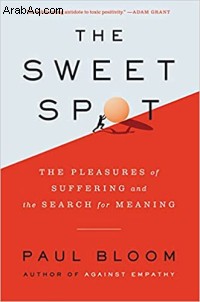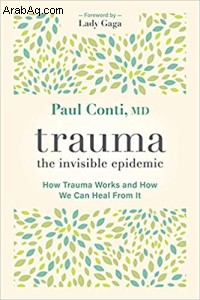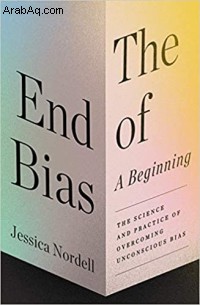تتطلب العديد من القضايا التي ابتلينا بها في عام 2020 وحتى عام 2021 تعاونًا واسع النطاق. لن نغير مسار الوباء أو العنصرية أو تغير المناخ أو المعاناة الإنسانية إذا لم نتمكن من تجاوز خلافاتنا وتعلم العمل معًا.
تتناول العديد من كتبنا المفضلة لهذا العام انقسامات المجتمع بشكل مباشر. إنها توضح لنا كيفية إعادة التفكير في مواقفنا العزيزة ، والاستماع بموضوعية أكبر إلى حواراتنا الداخلية ، ومحاربة التحيز ، والتواصل بطرق تربطنا بدلاً من أن تفرقنا.
في الوقت نفسه ، نحتاج جميعًا إلى رعاية رفاهيتنا. خلاف ذلك ، لن تكون لدينا الطاقة للبقاء مشاركين ونزدهر. هذا هو السبب في أن العديد من العناصر المفضلة لهذا العام تتناول أيضًا موضوع Greater Good مشكلات الخبز والزبدة - كيفية التخلص من القلق ، وإدارة الصدمات ، وممارسة التعاطف مع الذات ، وتجنب الإرهاق ، والبقاء لائقين معرفيًا.
على الرغم من وجود عدد كبير جدًا من الكتب الرائعة لقراءتها ومراجعتها ، فقد كانت هذه بعض الكتب المفضلة لموظفينا في عام 2021.
المكان الجميل:ملذات المعاناة والبحث عن المعنى بقلم بول بلوم
 Ecco، 2021، 304 صفحة.
Ecco، 2021، 304 صفحة. إنها تعتبر حقيقة عالمية في الحياة:سنذهب دائمًا نحو المتعة والراحة ونبتعد عن الألم والخطر ، إذا أخذنا في الاعتبار الاختيار.
إلا عندما لا نفعل ذلك. لماذا يستمع الناس إلى الأغاني الحزينة ، أو يأكلون طعامًا حارًا بشكل لا يصدق ، أو يغوصون في السماء ، أو يركضون في الماراثون ، أو يشاهدون أفلام الرعب ، أو ينخرطون في ممارسات جنسية تنطوي على ألم ، أو يبحثون عن عنف جسدي؟
هذا هو السؤال الذي طرحه عالم النفس في جامعة تورنتو بول بلوم للإجابة في The Sweet Spot . في حين أننا لن نتخلى عن العديد من الأفكار العلمية الرائعة التي يشاركها ، يبدو أن الإجابة تتلخص في حقيقة أن المعاناة تجعل الحياة أكثر أهمية ، في حين أن الحياة بدون أي معاناة يمكن أن تبدو بلا معنى.
المكان الجميل قد لا يغير حياتك - في بعض النواحي ، إنه كتاب غير حاسم بشكل محبط - ولكنه سيساعدك على فهم قدر كبير من السلوك البشري المحير ، وربما سلوكك أيضًا. يكتب بلوم أن المعاناة لها "مخاطر عملية وأخلاقية". "ولكن مع ذلك ، فإن المعاناة المختارة - بالطريقة الصحيحة في الوقت المناسب وبجرعات مناسبة - تضيف قيمة للحياة."
أربعة آلاف أسبوع:إدارة الوقت للبشر بواسطة أوليفر بيركمان
 Farrar، Straus &Giroux، 2021، 288 صفحة. اقرأ مقالًا مقتبسًا من أربعة آلاف أسبوع .
Farrar، Straus &Giroux، 2021، 288 صفحة. اقرأ مقالًا مقتبسًا من أربعة آلاف أسبوع . ماذا لو أولينا مزيدًا من الاهتمام للوقت المحدود لدينا على هذا الكوكب وعشنا حياتنا وفقًا لذلك؟
هذا السؤال هو جوهر كتاب الصحفي أوليفر بيركمان الاستفزازي والمسلي ، أربعة آلاف أسبوع . بينما يركز معظم معلمو إدارة الوقت على كيفية زيادة الإنتاجية إلى الحد الأقصى ، يوفر Burkeman نهجًا منطقيًا وأكثر إنسانية لإدارة الوقت. تتضمن نصائحه تجنب تعدد المهام ، والتركيز على أهداف قليلة فقط ، وإعطاء الأولوية لعلاقاتك ، وحتى ممارسة عدم القيام بأي شيء. ووفقًا له ، فإن التعامل مع حياتك كما لو كانت فرصة للتساؤل وليس شيئًا يمكن إدارته بشكل دقيق يمكن أن يساعدك على الابتعاد عن سباق الفئران والعثور على السعادة.
كتب:"عندما ندرك ضيق الحياة - ونتقبل حقيقة أن بعض الأشياء يجب أن تُترك غير مكتملة ، سواء أحببنا ذلك أم لا - فإننا أكثر حرية في التركيز على الأمور المهمة".
التخلص من القلق:علم جديد يوضح كيفية كسر دائرة القلق والخوف لشفاء عقلك بواسطة جودسون بروير
 Avery، 2021، 304 صفحة. اقرأ مراجعتنا عن تخفيف القلق
Avery، 2021، 304 صفحة. اقرأ مراجعتنا عن تخفيف القلق هناك مليون نصيحة وواحدة حول ما يجب القيام به عندما تشعر بالقلق. لكن كتاب الطبيب النفسي جودسون بروير تخفيف القلق يأخذ نهجًا مختلفًا. في الواقع ، بيت القصيد هو أن النصائح وحدها لن تساعد أولئك الذين يعانون من القلق.
بناءً على بحثه الخاص ، يوضح بروير كيف يوجد القلق داخل العادات التي تشكل حياتنا اليومية. والعادات ثابتة. قبل أن ننمي عادات جديدة أكثر هدوءًا ، علينا أن نفحص العادات القديمة ، ونلاحظ كيف أنها تؤذينا ، ولكن أيضًا نفهم ما الذي نحصل عليه منها والذي يجعل أدمغتنا تتشبث بها. على سبيل المثال ، حتى القلق يمكن أن يكون مفيدًا ، لأنه يجعلنا نشعر وكأننا نحل المشاكل أو نمنع الكوارث في المستقبل.
يجادل بروير بأن عملية النظر عن كثب إلى عادات القلق لدينا يجب أن تخفف من قبضتها علينا بشكل طبيعي. بعد ذلك ، لدينا بالفعل مساحة لعادات جديدة ، مثل ممارسة اليقظة ، والفضول ، واللطف المحب تجاه أفكارنا ومشاعرنا.
التخلص من القلق يمنحنا أدوات للعمل معها أدمغتنا ، بدلاً من الشعور باستمرار أننا نحارب أنفسنا.
الصدمة:الوباء غير المرئي:كيف تعمل الصدمات وكيف يمكننا التعافي منها بقلم بول كونتي
 يبدو صحيحًا ، 2021 ، 200 صفحة.
يبدو صحيحًا ، 2021 ، 200 صفحة. قد يُغفر القارئ المميز إذا اعتقد أن صدمة - مع مقدمة من ليدي غاغا وتأييد من تومي هيلفيغر - هو كتاب خفيف الوزن. إنها بالتأكيد ليست أكاديمية.
وبدلاً من ذلك ، فإنه يوفر نظرة عامة موثوقة ويمكن الوصول إليها عن البحث في أسباب الصدمة وعلاجها ، والتي تم إحياؤها من خلال قصص مؤلفها والطبيب النفسي بول كونتي ومرضاه.
مرارًا وتكرارًا ، وبعدة طرق مختلفة ، تؤكد كونتي كيف أن الصدمة وعواقبها "تعمل في الخفاء" ، ولهذا السبب من المهم جدًا للأطباء وصانعي السياسات والأفراد الذين عانوا من الصدمات وغيرهم أن يتسلحوا بفهم كيفية حدوثها يعمل. أكثر من ذلك ، على الرغم من ذلك ، "ليس من المفترض أن نواجه الصدمة وحدنا" ، كما يكتب. باختصار ، فإن طريقة الوقاية من الصدمة وعلاجها هي مزيج من المعرفة والاتصال.
“Trauma tries to convince us that compassion, community, and humanity aren’t possible,” he writes. “I want that to change—as quickly as possible—and this book is my change agent.”
Think Again:The Power of Knowing What You Don’t Know , by Adam Grant
 Viking, 2021, 320 pages. Read our Q&A with Adam Grant.
Viking, 2021, 320 pages. Read our Q&A with Adam Grant. In a rapidly evolving era—like the one we are living through now—rigid thinking can set us on the wrong course. We need to be open to new information and let our views evolve. Otherwise, we risk being seen as pompous or out of touch with reality.
In Think Again , organizational psychologist Adam Grant presents fascinating research on what helps people remain flexible in their thinking and sway others toward becoming more open-minded. The ability to “rethink,” argues Grant, is not only a crucial skill for facing crises like the pandemic, it’s also better for our relationships and personal well-being.
His book provides several takeaways that can be applied in everyday conflicts—like admitting your own vulnerabilities, being willing to listen with curiosity to others, not diluting your arguments with endless facts (keeping it simple), and giving others permission to call you out when you’re being obstinate. Reading his book is like a blueprint for becoming a more thoughtful person.
“Too many of us get trapped in mental prisons of our own making,” says Grant. “But if we could be committed to rethinking, we might have a slightly more open-minded society.”
Keep Sharp:Build a Better Brain at Any Age , by Sanjay Gupta
 Simon &Schuster, 2021, 336 pages. Read our review of Keep Sharp .
Simon &Schuster, 2021, 336 pages. Read our review of Keep Sharp . Many older people worry about developing dementia as they age. But there is a lot you can do to keep your brain working well at any age, writes CNN medical correspondent Sanjay Gupta in his book, Keep Sharp —if you take the research on brain health to heart, that is.
In his book, Gupta gives us five main take-home messages culled from neuroscience research:We need to move our bodies regularly (even mild exercise helps), get solid sleep, eat well, connect with others, and find meaning in life.
Along the way, he busts myths around aging and dementia:For example, it’s not true that older adults don’t have cognitive strengths, forgetfulness is a sure sign of oncoming dementia, or doing puzzles staves off Alzheimer’s. He also identifies the main dementia risk factors, which can appear in younger as well as older folks, making his book relevant to everyone.
“The brain can be continuously and consistently enriched throughout our life no matter your age or access to resources,” he writes. If you change your lifestyle, even a little, he promises, “Your brain—no, your whole body—will love it.”
Saving Us:A Climate Scientist’s Case for Hope and Healing in a Divided World , by Katharine Hayhoe
 Atria/One Signal Publishers, 2021, 320 pages. Read our Q&A with Katharine Hayhoe.
Atria/One Signal Publishers, 2021, 320 pages. Read our Q&A with Katharine Hayhoe. Climate change needs to be on everyone’s mind, says climate scientist Katharine Hayhoe. But too many of us feel overwhelmed and avoid talking about it, which keeps us from recognizing the need to address the problem now and stave off disaster.
In her book, Saving Us , Hayhoe offers a course correction around how to talk about climate change with anyone and everyone. She argues that making climate change feel more personal and immediate, appealing to people’s moral values, and sharing specific steps they can take to lessen their carbon footprint can help people overcome inertia.
Her book is full of inspirational stories of convincing people why they should care about climate change—even traditionally resistant groups, like American evangelicals, Libertarians, or conservatives. By focusing on how we can successfully encourage everyone to take climate change seriously and do their part, she offers hope for avoiding disaster through collective action.
“The hope of a better future depends on you, and me, and all of us,” she says. “Ordinary people have changed the world before, and we can do it again. How do we begin? By using the most powerful force we have, our voice.”
Chatter:The Voice in Our Head, Why It Matters, and How to Harness It , by Ethan Kross
 Crown, 2021, 272 pages. Read our review of Chatter .
Crown, 2021, 272 pages. Read our review of Chatter . One of the biggest contributors to our happiness is something we barely pay attention to:the voice inside our own heads.
As psychologist Ethan Kross describes in his book Chatter , that voice is constantly analyzing the situations we’re in, reflecting on the past and future, and telling us who we are. While sometimes friendly and optimistic—it’s OK, everything’s going to work out! —it can also be critical and downbeat. Our inner voice can berate us for mistakes or decide our life is ruined. It can ruminate on negative emotions and experiences, dredging them up without any kind of constructive resolution.
According to Kross, there are three main ways we can turn down the chatter in our heads: shifting our perspective so we’re not so immersed in our problems, talking with others to get support, and changing the environment around us to promote calm. Not only can we reduce the negativity in our minds, but we can also cultivate a calmer, kinder, and more helpful perspective on our lives.
The Burnout Epidemic:The Rise of Chronic Stress and How We Can Fix It , by Jennifer Moss
 Harvard Business Review Press, 2021, 256 pages. Read our review of The Burnout Epidemic .
Harvard Business Review Press, 2021, 256 pages. Read our review of The Burnout Epidemic . Burnout is rampant in many workplaces in the United States. But, though organizations might put their focus on wellness programs to increase worker resilience, the roots of burnout likely lie elsewhere—in the organization’s work policies and culture, says journalist Jennifer Moss, author of The Burnout Epidemic .
“Yoga, vacation time, wellness tech, and meditation apps can help people feel optimized, healthier,” she writes. “But when it comes to preventing burnout, suggesting that these tools are the cure is dangerous.”
Moss reviews the most common causes of burnout:overworking, not having enough autonomy, lacking recognition, poor relationships, and more, providing tips on how to address these problems. While she acknowledges that individual psychology plays a role, and some people are more susceptible to burnout than others, she argues there is still much we can do to make workplaces more humane places to be.
Fierce Self-Compassion:How Women Can Harness Kindness to Speak Up, Claim Their Power, and Thrive , by Kristin Neff
 Harper Wave, 2021, 384 pages. Read an essay adapted from Fierce Self-Compassion .
Harper Wave, 2021, 384 pages. Read an essay adapted from Fierce Self-Compassion . Psychologist Kristin Neff has studied self-compassion for many years and found it to be a useful wellness tool, helping people cope with personal suffering. In her new book, Fierce Self-Compassion , Neff makes a slightly different case in favor of practicing self-compassion:It can give you the courage to recognize when you and others are being wronged—and to stand up for social justice.
“By aiming compassion inward as well as outward, we can better confront the pain of injustice without being overwhelmed, and find the strength and energy to fight for what’s right,” she writes.
Neff argues that, too often, women are told not to get angry, to play nice, and to defer to those around them. But this is not a good way to protect yourself, she writes; women need to honor their anger, understand what it’s telling them, and fight against oppressors, when required. Though the book is aimed primarily at women, it is instructive to men, too, as it explains the insidious effects of inequality on the human condition.
The End of Bias:A Beginning:The Science and Practice of Overcoming Unconscious Bias , by Jessica Nordell
 Metropolitan Books, 2021, 368 pages.
Metropolitan Books, 2021, 368 pages. We all make unconscious judgments about people based on their social identities and the cultural stereotypes that cling to them. But bias can be disastrous for its targets, affecting their health, success, and happiness, writes journalist Jessica Nordell in her book, The End of Bias . If we don’t do something about reducing our bias, we will have more inequality at home, at work, and elsewhere, making our vision of a fairer society out of reach.
While bias may seem intractable, Nordell offers hope for change, providing examples of interventions that have successfully reduced bias individually and institutionally. (Spoiler alert:Workplace diversity programs are usually not the answer.)
What’s needed, she writes, is the willingness to look honestly at ourselves and our institutions, recognize privilege when we have it, and consciously root out bias wherever we see it. In that way, we can give everyone the opportunity for a better life—including those of us who are more privileged.
The Social Instinct:How Cooperation Shaped the World , Nichola Raihani
 St. Martin's Press, 2021, 304 pages. Read our Q&A with Nichola Raihani.
St. Martin's Press, 2021, 304 pages. Read our Q&A with Nichola Raihani. When it comes to cooperation, humans are a mixed bag. In our response to the COVID-19 pandemic, for example, we’ve seen immense cooperation around masking and vaccination—while other people chose more individualistic paths.
Why we don’t always cooperate is the subject of evolutionary biologist Nichola Raihani’s book, The Social Instinct . As Raihani explains, humans have survived well because of their ability to interact and work with people outside their immediate family groups, organizing around shared needs—like agriculture, trade, and protection from outside threats.
But evolutionary forces also act against cooperation, such as when the drive to protect one’s family’s interests (and, so, pass on one’s genes) conflicts with community needs for a fair distribution of resources. The fear of not having enough to go around can lead to narrower (and more problematic) forms of in-group cooperation, too, like nepotism and corruption.
To increase global cooperation, Raihani argues that we must expand our circle of care and share resources more fairly. Luckily, in the long run, our cooperative nature tends to win out.
High Conflict:Why We Get Trapped and How We Get Out , by Amanda Ripley
 Simon &Schuster, 2021, 368 pages. Read our Q&A with Amanda Ripley.
Simon &Schuster, 2021, 368 pages. Read our Q&A with Amanda Ripley.
Amanda Ripley believes that conflict can be good. “We need healthy conflict in order to defend ourselves, to understand each other, and to improve,” she writes in her book High Conflict .
According to Ripley, things go south when conflict becomes a “good-versus-evil kind of feud, the kind with an us and a them . " When we’re trapped in this “high conflict,” we don’t discover new solutions or come to understand another point of view. Instead, we get sucked into a downward spiral where we dehumanize our adversary, obsess over our differences, and want only to defeat the other side. The conflict takes on a life of its own.
We’ve all been there. But what makes High Conflict so powerful and timely is how Ripley explains why and how high conflict can take root so deeply in the lives of individuals, communities, and entire societies.
Fortunately, she also shows that high conflict isn’t inevitable:The second half of the book offers ways to avoid or extricate yourself from this all-consuming, us-versus-them mentality. High Conflict ultimately provides a valuable guide to navigating our personal relationships as well as a hopeful vision for escaping the tribal conflicts tearing our country apart.






